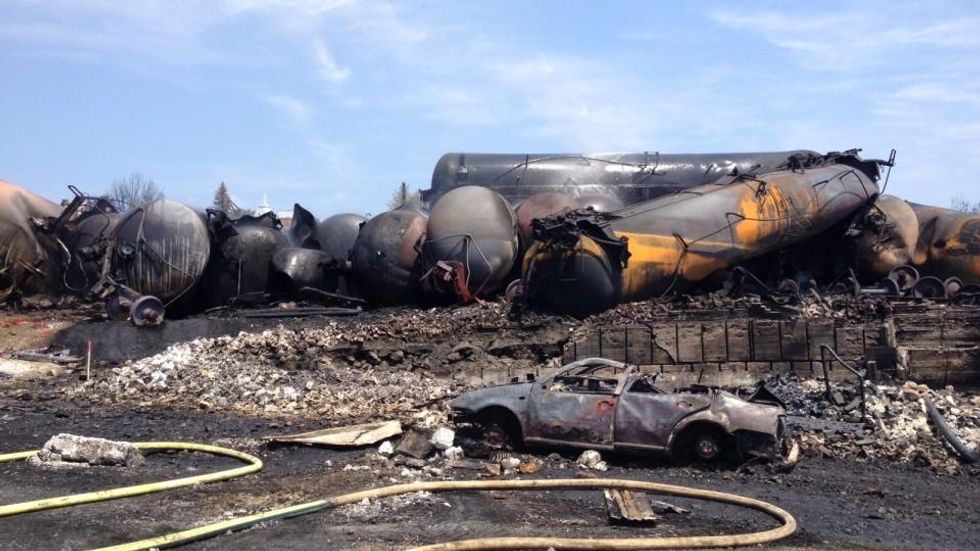As the city of Lac-Megantic continues to sift through the ruins of last month's devastating oil train derailment and explosion which destroyed the small downtown killing 47 people and causing untold environmental damage, new information has surfaced that the private rail company responsible for the disaster has an insurance policy that will only cover a small fraction of the cost of cleanup.
In another example of an industry privatizing the profit yet socializing the cost, this revelation follows the news that the Montreal, Maine & Atlantic Railway (MM&A) company filed for bankruptcy Wednesday, leaving the town, the victims' families, and the local ecosystem shouldered with the burden of this 'unnatural disaster.'
Bankruptcy documents filed with U.S. and Canadian federal courts Wednesday show that the company's policy with XL Insurance Company Ltd. only covered MM&A for $25 million in damages in relation to evacuation, fire suppression, pollution cleanup, bodily injury and property damage.
However, early estimates reveal that the environmental cleanup for the derailment of the train--which spilled tens of thousands of barrels of crude oil into the town and nearby Chaudiere River--will cost at least $200 million. Further, MM&A is being sued by the families of the 47 victims of the explosion, as well as the owners of the 30 buildings which were destroyed, with the value of the claims expected to be "in the tens of millions of dollars," the Portland Press Herald reports.
All of this begs the question, who will be accountable for the hundreds of millions that remains in unpaid damages?
"The news that MM&A is grossly under-prepared to compensate the families of Lac Megantic is horrible but far from surprising," Meaghan LaSala, an organizer with 350 Maine, told Common Dreams. "It is consistent with the experiences of communities across the country who find that no one is accountable to them in the wake of unnatural fossil fuel disasters."
Describing MM&A as just a "small cog in the wheel," Edward Jazlowiecki, a U.S. lawyer representing a number of Lac-Megantic families, optimistically points out that MM&A's parent company Rail World Group--which is ironically headed by the same man who chairs MM&A, Edward Burkhardt--"has assets all over the country."
Though, as LaSala notes, "Thanks to the power of lobbying, parent companies are usually protected. Companies are often able to act as judge and jury regarding who is eligible to receive damages, as in the case of Enbridge and the Kalamazoo spill."
The situation highlights the great risk so often hefted on the backs of individuals and ecosystems by dangerous and polluting industries, which--with so little oversight and regulation--are rarely forced to account for the true cost of their trade.
Representing MM&A in the U.S., attorney Roger Clement told the CBC that he was "not aware that a claim for environmental cleanup would have any priority on the assets of the company." Nor would the provincial government or the town of Lac-Megantic itself, which has already paid nearly $8 million to cover the initial wave of cleanup costs.
_____________________

